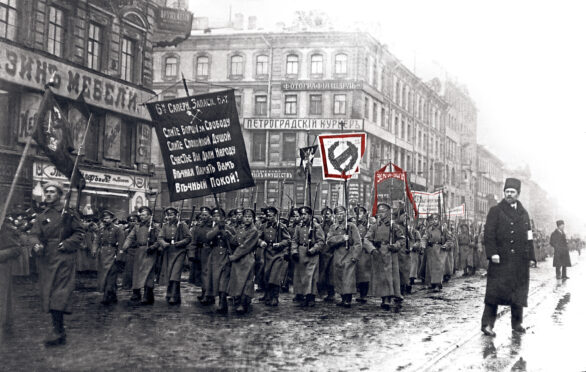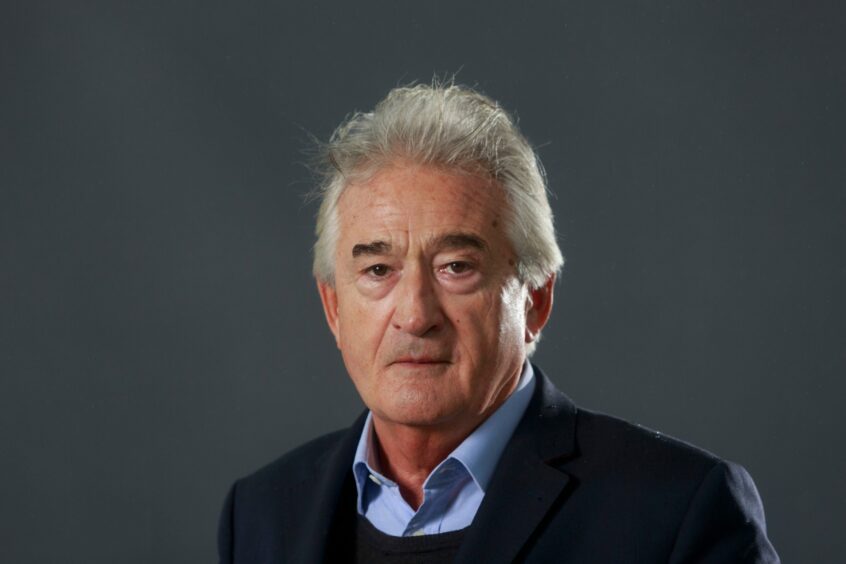
There has already been 181 days of bloodshed, brutality and suffering since Russia’s invasion of Ukraine, and one of the world’s pre-eminent military historians believes the war will continue to rage on for much longer.
Sir Antony Beevor says the conflict won’t end until Putin’s Russia is defeated.
“Nobody knows how it’s going to end but one thing is certain, it can’t end in a negotiated settlement,” said the writer, whose books, including his bestselling Stalingrad and Berlin war histories, have sold eight million copies and been translated into 33 languages.
“This talk of allowing Putin to withdraw – the Ukrainians know he cannot be trusted in any agreement whatsoever. He would love to have a ceasefire, even make one or two territorial concessions temporarily, only to attack again a year or two later, and the threat of that would be enough to wreck the Ukrainian economy anyway.
“So the war will go on until there is a Russian defeat and I think there will be, providing the West continues to equip Ukraine. There will be a weakening in the west as far as the EU goes when the winter comes, but that doesn’t necessarily mean Ukraine will be abandoned.
“It will make it hugely difficult and there is no way it is going to stop for another year or two, which is appalling. But until they can push the Russians back and the West gives Ukraine the equivalent of a Nato Article 5 guarantee of coming to its aid if it is attacked again, then I don’t see any other solution.
“Putin must not be allowed to get away with this particular one; it would only encourage every other authoritarian regime, particularly China, to think they can get away with any other form of armed intervention whenever they felt like it. The real problem will be Crimea – the Ukrainians are determined to take that and Putin is obsessed with it being an integral part of Russia, so Crimea is one we have to watch and I think it’s interesting that this will be the focus of the fighting after Kherson. It is going to be one of the key elements.”
Last week, a Russian arms store in Crimea was hit by a series of explosions, which was blamed on sabotage, as railway services were disrupted and a village was evacuated. It came a week after what appeared to be a Ukrainian attack on a Russian military base in the region.
The invasion of Ukraine coincided with the release of Beevor’s book, Russia: Revolution And Civil War 1917-1921, in which he takes a detailed look at the devastating struggle in Russia following the collapse of the Tsarist empire. Not only is it regarded as savage but also as one of the most influential conflicts of the modern era.
“You can imagine, with the coincidental timing of the book coming out as the war started, has meant the last few months has seen people wanting to know how far this reaches back and also, why the Russian military are so cruel and brutal,” continued Beevor, who will be in conversation at the Edinburgh Book Festival this week. “A number of historians, and I would agree, trace it back to the Mongol invasions of the 13th Century.
“Russia has always felt completely surrounded and threatened by the outside world. Warfare at that particular stage was one of conspicuous cruelty and it was regarded as massive destruction – massacre of civilians, mass rape, looting. These were seen as essential weapons of war and that mentality hasn’t gone away from the Russians. It had in western Europe, especially in the age of enlightenment and all the rest of it, but not in Russia.
“We saw this, not so much in the First World War, but in the Russian Civil War and then in the Second World War with the revenge exacted on Germany and elsewhere. And then Chechnya, Syria and now in Ukraine.
“A lot of it comes, one has to remember, from what I describe as the knock-on theory of oppression. The Russians have always been treated so badly by their leaders. In the early ’90s, there were nearly 5,000 suicides each year among the conscripts during training because they were treated so badly. It was the same in the Second World War. No one bothered about the individuality of the soldier. If they didn’t do as they were told, if they didn’t grab their rifle and march, they were shot. This attitude has continued. We’ve seen the way the conscripts have been conned completely; they’ve been told they were not going to war, then finding their contract has been changed and they were now volunteers. That is causing tremendous resentment and is why morale is so bad among the Russian troops.”
Beevor says he is dubious about drawing historical parallels because they can often be misleading, but he did concede there are similarities around this conflict and those from the past.
“The vast majority ruled it out that Putin would attack Ukraine, and in the 1930s Britain and France refused to believe anyone in Europe would be mad enough to want another war after the horrors of the trenches of the First World War and that’s why the threat of Hitler wasn’t taken as seriously as it should have been. What they underestimated is he wanted a war, and if you have someone in charge of a country with quite a powerful army who wants a war, then diplomacy will not stop that war from happening. We could not imagine anyone would want to have another conventional state-on-state land warfare, but we find we are back to years before, almost in 1945, with Putin’s invasion.
“Another parallel is before the First World War, an influential writer read all over Europe called Norman Angell said it was impossible to have a war in the modern globalised society because we depend on each other so much commercially and in terms of communication, and everyone took it seriously and thought there was no threat, and so were unprepared after the assassination of the Archduke. That was again repeated in a way with Angela Merkel’s idea that if we embrace Russia as part of our economic system, the threat will be dealt with and so we didn’t need to worry about weapons and armies. That was when the Bundeswehr was sort of completely rundown and now we see Germany in the state that it is. It has been taken hostage.”
Beevor, who is currently undergoing cancer treatment, wished to write a book about the Russian Civil War because he recognised that it, as well as conflicts in Finland, Hungary and Germany, was “the origin in a way for what turned into the great battle between fascism and communism and so was one of the most influential conflicts of the 20th Century”.
He continued: “All historians recognise that the First World War was the original catastrophe of the 20th Century but the civil wars that followed were incredibly important, because the Russian Civil War was so horrific that it created a vicious cycle of hatred and fear right across Europe and beyond. The idea that everything could be destroyed, turned upside down, terrified the middle classes, while on the left people were terrified by the fascist white reaction and the threat to destroy any form of socialism or liberalism.”
He originally proposed the book in the 1980s and it was rejected by his publisher. With hindsight, he is glad, as he doesn’t feel he was ready to tackle such a massive subject and neither were the Russian archives open at that time. Beevor’s books have been lauded for their use of accounts from the man on the street rather than being based just on military testaments, and much of those testimonies are found in the archives.
He recognised 30 years ago that there was a need to integrate both sides of the story to convey what life was really like in times of war.
“History had always been written in a very collective way in the past, a top-down version of what went on with very little human detail. That’s why it became increasingly obvious to try to integrate history from above with history from below. By bringing that material in, one can bring a period to life within the context of the overall geo-political conflict.”
Beevor faces five years’ imprisonment should he enter Russia due to criticising the Red Army in previous books, so he has a small but trusted team to go through the archives and pick out the stories and testimonies that add colour and context to moments in history. Chief among those is Lyuba Vinogradova, to whom the book is dedicated. She was a 21-year-old PhD student when she began working with him on his Stalingrad book in 1994.
“She proved she had a brilliant nose and instinct for the right material,” he added. “She had already started researching in the Russian archives before Covid, while I was still halfway through my previous book, so she was able to get a vast amount done. Because I can’t go back to Russia, she was able to use a letter from a professor who is a mutual friend that said she was working for him and so wasn’t associated with Beevor, ‘the chief slanderer of the Red Army’, as I am sometimes regarded in Russia.
“There are millions of pages in these archives, they are vast, so unless you can select the little details that will bring something to life, you’ll be wasting your time.”
Another of his team, Oleksii Ivashyn, has gone from combing the Ukrainian war archives to fighting in the war against Russia.
“On February 24, he put away his laptop, drove his family to the Polish border, grabbed a rifle and medic pack, and is still fighting near Kharkiv for the Ukrainian Army.”
Only time will tell how this current conflict will be recorded in the history books.
Antony Beevor In Conversation With Allan Little: The Epic Story Of Russia’s Revolution, Edinburgh Book Festival, Wednesday

Enjoy the convenience of having The Sunday Post delivered as a digital ePaper straight to your smartphone, tablet or computer.
Subscribe for only £5.49 a month and enjoy all the benefits of the printed paper as a digital replica.
Subscribe